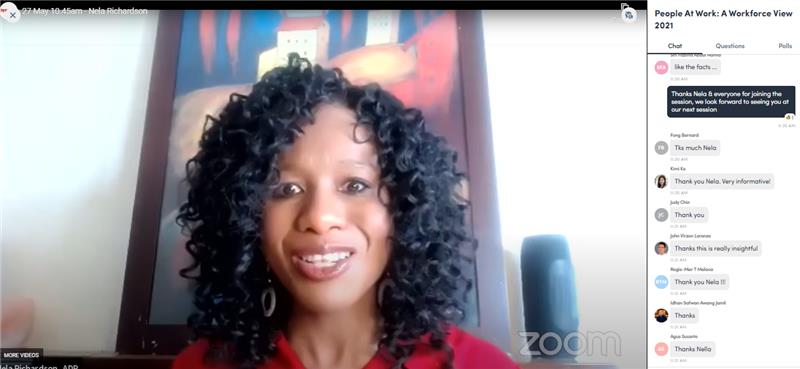Key predictions that will define the future of work
- Shawn Liew

As Day 1 of HR Tech Connect 2021 drew to a successful conclusion, HR leaders were provided with plenty of food for thought on how they can redesign their workforce to thrive in a constantly changing world of work.
The big theme for HR transformation is resilience, and how organisations can create a more adaptive, agile and design-oriented function to create great employee experiences, said Josh Bersin, Global Industry Analyst and Dean of the Josh Bersin Academy.
In his opening keynote address at HR Tech Fest Connect 2021, Bersin pointed out that while there will continue to be “massive investment” in HR tech, what organisations need are HR tools that work more like design tools. This, he explained, will enable the design of great employee experiences to make work better, and to provide the solutions that employees need to carry out their work.
Globally, 64% of employees have been impacted professionally because of the pandemic. In Asia-Pacific, the ratio goes up to 70%, shared Nela Richardson, Chief Economist, ADP.
Based on new research from the ADP Research Institute, Richardson highlighted that 33% of workers in the region are logging more than 11 hours daily, which is a “significant increase” compared to 2020.
However, despite the huge and diverse challenges presented by the pandemic, the APAC region will continue to power ahead in many respects, said Richardson, as she detailed the central role HR professionals are playing as coordinators of a variety of different needs between employees and employers.
As hybrid working becomes increasingly entrenched, organisations need to rethink how they design their future workplace experience, suggested Alex Badenoch, Transformation, Communications and People Group Executive, Telstra.
Badenoch shared Telstra’s refreshed flexible work policy, which gives employees more choice to decide how, where and when to work. She also urged organisations to focus on and introduce more openness when it comes to discussing mental health in the workplace.
Since the start of the pandemic, HR has stepped up and made a huge difference in the workplace, helping organisations effectively manage the crisis.
Paying tribute to HR professionals, Johannes Eckold, Director, HCM Strategy & Business Development ASEAN, Oracle, described the “5 HR Superpowers for 2021” as the Technology Master, the Mental Healer, the Workforce Strategist, the Skill Wizard and the Policy Breaker.
The Workforce Strategist, for instance, plays a critical role in executing strategic workforce planning to allow businesses to be ready for the future.
With people being the greatest asset for any organisation today, generational diversity should be on at the top of any D&I agenda, said Rachele Forcardi, Global Thought Leader, Author and Founder of XYZ@Work.
HR leaders need to realise that generational conflicts are caused by a lack of mutual knowledge and understanding, and must recognise the strengths of each generation of workers, who, despite their differences, are generally keen to learn from each other, she added.
In proposing better ways to work for organisations in South-East Asia, Lauren Huntington, EX Solution Strategist, Qualtrics, suggested that organisations need to rethink the way they design and improve the employee experience.
Listen more during times of change and disruption, use bottom-up and top-down feedback to inform the future of work, and take action to engage your workforce and prepare your workspace for the future, she added.
Organisations that invest in employee experience, will outperform those that do not, cautioned Drew Fernandez, Global Chief People Officer, Coca-Cola Bottling Investments Group, The Coca-Cola Company.
He urged organisations to ask themselves: Do employees feel a sense of purpose, do they feel a sense of worth, and do they feel that they are treated fairly? The onus then, is for organisations to allow employees to find meaning in the work they do, and to create a culture where they want to show up for work.
To ensure organisations continue to survive and thrive in today’s new world of work, there has never been a more pressing demand for Talent Acquisition (TA) teams to rethink and reconfigure their recruitment strategies, said Neil Jones, Regional Managing Director, APAC, AMS; and Madeline Laurano, Founder of Aptitude Research.
In a joint presentation, they shared that 40% of organisations had layoffs in the TA teams in the last year, adding that efficiency is now a key driver for TA technology and services investment, and urged organisations to close the capability gaps in talent acquisitions.
Drawing on key findings of a global study conducted by HRM Asia and i4cp, Kevin Martin, Chief Research Officer, Institute for Corporation Productivity (i4cp), revealed that 74% of organisations in Asia and India have redefined what ‘flexible work’ means to them in the wake of the pandemic.
He advised organisations to establish guidelines for decisions regarding onsite, remote and hybrid workers, and to measure the performance of new flexible work options based on achievement of individual, team and organisational objectives and goals, and overall workforce safety and health.
As flexible work continues to create an economy of individuals, the 2025 workforce will look profoundly different than it does today, predicted Anita Lettink, Advisor, Future of Work Speaker and Founder of HRTechRadar.com.
In her closing keynote address, she explained that these are individuals who are digitally savvy and have a clear understanding of the value of their skillsets. Organisations thus, need to adopt a personalised and flexible approach to talent, which allows them to place the right skills in the right place at the right time.
This includes dividing work into tasks and activities can help organisations understand which capabilities are needed to execute them and focusing on personalisation through the design of a variety of contract options, Lettink concluded.






